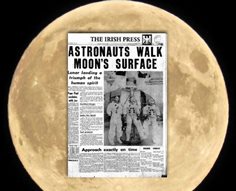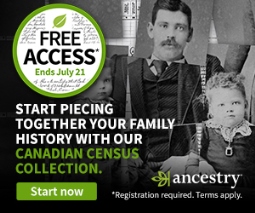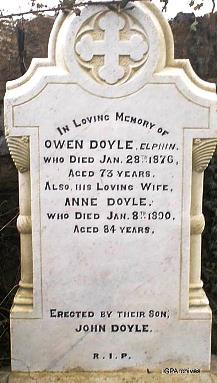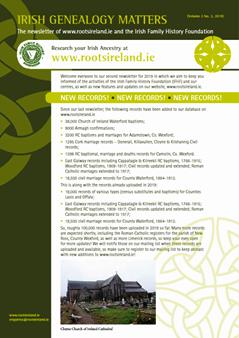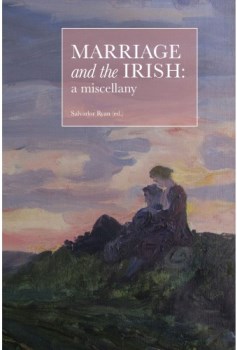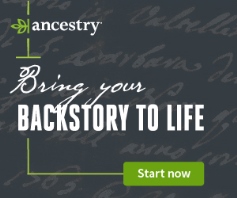Monday 15 July:
NLI Main Reading Room and Manuscript Room closed all day to facilitate the Library's continuing redevelopment of the premises. Venue: National Library of Ireland, Kildare Street,
Dublin 2. All other services/exhibitons/cafe/Genealogy Advisory Service operate as normal.
 Monday 15 July: Bank Holiday
Monday 15 July: Bank Holiday in Northern Ireland. PRONI, private libraries and all public lending libraries across
Northern Ireland will be closed until Tuesday 16 July. This public holiday does not apply in the Republic of Ireland.
Tuesday 16 July: The Myth Business: Alma and Jeremiah Curtin in Dingle and Ventry, 1892, with Professor Angela Bourke. Host: Dingle Historical Society. Venue: Dingle Skellig Hotel,
Dingle, Co Kerry. 8pm. All welcome.
Wednesday 17 July: Tara: 'The Resuscitated Jerusalem', with Dr Mairead Carew. Third of this year's Tara Lecture Series. Host: Office of Public Works. Venue: Hill of Tara Centre,
Castleboy, Co Meath. Free. All welcome. Seating limited so arrive early to ensure you get a seat.
Thursday 18 July: Irish Wills in the Society of Genealogists Library, with Else Churchill. Host and venue: Society of Genealogists, 14 Charterhouse Buildings, Gosport Road,
London EC1, UK. 1 hour. Free.
Bookings.
Friday 19 July: The heritage, archaeology, and folklore of some sacred wells in East Galway, with Christy Cunniffe. Host and venue: Aughrim Visitor Centre, Aughrim, nr
Ballinasloe, Co Galway. 2pm. Free. All welcome.
Saturday 20 July: Dead famous – Who is buried where in Northern Ireland, with David Hume. Host: Whitehead Summer Festival and Whitehead Library. Venue: Whitehead Library, Edward Rd,
Whitehead, Co Antrim BT38 9QB. Booking essential T 028 9335 3249 / whitehead.library@librariesni.org.uk. Free. All welcome.
Saturday 20 July: A celebration of People, Place and Heritage, an afternoon conference. Part of the Crinniú festival. Host and venue: Irish Workhouse Centre,
Portumna, co Galway. 1-4pm. Free.
Details.
Saturday 20 July: HER story in history - Irish Women who made a difference, with Maura Barrett. Ormond Castle Lecture Series. Host and venue: Tipperary Studies, County Library, Castle Ave, Thurles Townparks,
Thurles, Co. Tipperary. 11:30am. Free. All Welcome. Booking essential on 051 640787.
Saturday 20 July: Lesbian Lives in 1916 and the Irish revolutionary period, with Claire Hackett. Host and venue: Áras Uí Chonghaile, James Connolly Visitor Centre, 374 Falls Rd,
Belfast BT12 6DG. 1–2pm. Free. No booking required.
Monday 22 July:
NLI Reading Room and Manuscript Room closed all day to facilitate the Library's continuing redevelopment of the premises. Venue: National Library of Ireland, Kildare Street,
Dublin 2. All other services/exhibitons/cafe/Genealogy Advisory Service operate as normal.
Tuesday 23 July:
Using social media for Irish research, with Laura Mackinson and Ilene Murray. Host: St. Louis Genealogical Society. Venue: Auditorium at St. Louis County Library HQ, 1640 South Lindbergh,
St Louis, MO 63131, USA. 7–8:30pm. Members and non-members welcome. Open to members and non-members.
Wednesday 24 July: Rebels, Redcoats and Contested Identities: The Battle of Tara, 1798, with Dr Ciaran McDonnell. Last of this year's Tara Lecture Series. Host: OPW - Office of Public Works. Venue: Hill of Tara Centre, Dunsany,
Navan, Co. Meath. Admission is free but limited seating, so arrive early. All Welcome.
Wednesday 24 July: Irish Family History Assistance. Host: Genealogical Society of Victoria. Venue: GSV Library, Level 6, 85 Queen St,
Melbourne 3000, Australia. 10am to 4pm. Free for members. $20 non-members. Bookable one-hour appointments with a research consultant.
Details.
Thursday 25 July: Book launch: Interned. The Curragh Internment Camps during the War of Independence, by James Durney. Host and venue: Curragh Military Museum,
Curragh Camp, Co. Kildare. All welcome. 7:30pm. Lord Edward's Own Re-Enactment Group will be taking part. RSVP to cilldara2016@gmail.com.
Sunday 28 July: Genealogy Day at Cabinteely House. Hosts: Genealogical Society of Ireland and DLR Summer Festival 2019. Short talks, demonstrations and advice for beginners and above. 2-5pm.
Cabiteely Park, Co Dublin. No booking required.
Details.













